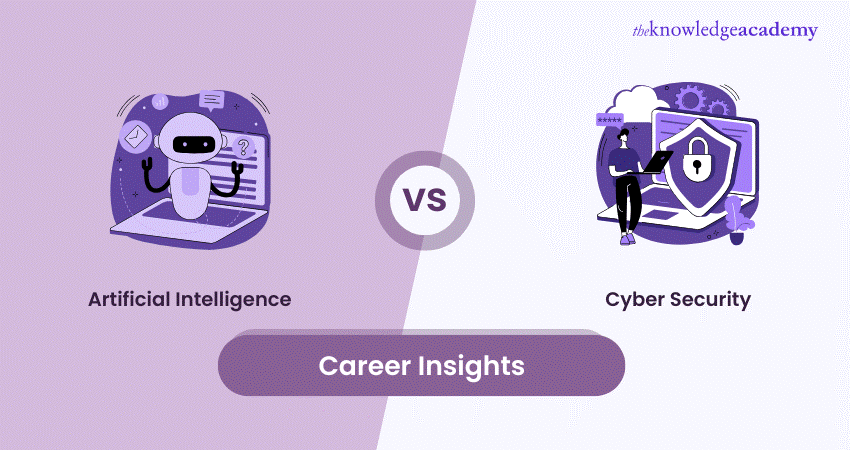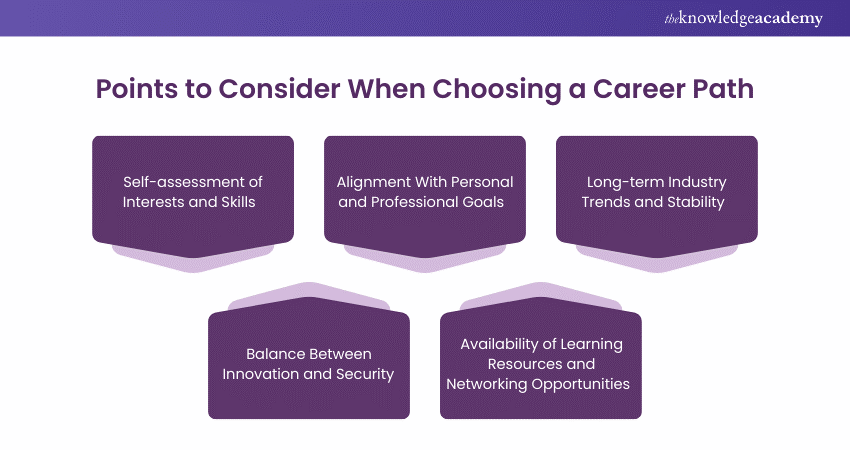We may not have the course you’re looking for. If you enquire or give us a call on +44 1344 203 999 and speak to our training experts, we may still be able to help with your training requirements.
We ensure quality, budget-alignment, and timely delivery by our expert instructors.

Imagine a world where Artificial Intelligence vs Cyber Security defines the future of technology—one driving innovation and automation, the other protecting our digital lives from threats. These two groundbreaking fields are reshaping the digital landscape, sparking curiosity and excitement among aspiring professionals.
But with their unique opportunities and challenges, how do you choose the right career path This blog dives deep into the differences, benefits, and future potential of Artificial Intelligence vs Cyber Security. Ready to find your perfect fit? Let’s explore!
Table of Contents
1) What is Artificial Intelligence (AI)?
2) What is Cyber Security?
3) Artificial Intelligence vs Cyber Security Careers
4) Key Factors to Consider When Choosing Your Career Path
5) Is AI the Future of Cyber Security?
6) Which is More Challenging, AI or Cyber Security?
7) Conclusion
What is Artificial Intelligence (AI)?
Artificial Intelligence can be defined as the intellect exhibited by machines. It represents an effort to replicate human-like capabilities in machines through algorithms and technology. Proponents of AI argue that since the human brain operates on understandable principles, its processes can be simulated using computational systems.
AI applies the simulation of human intelligence by machines, particularly computer systems. Typical applications include expert systems, natural language processing, speech recognition, and machine vision. AI is already making significant impacts in various fields, such as speech recognition, autonomous vehicles, intelligent web browsers, and many others.
What is Cyber Security?
Cyber Security shields computers, servers, mobile devices, networks, electronic systems, and data from malicious attacks and unauthorised access. As data grows exponentially and the internet remains unregulated, Cyber Security has become critical for businesses and individuals.
Cyber Crimes such as phishing, social engineering, spoofing, reverse engineering, and other tactics exploit vulnerabilities to compromise digital security. The primary objective of Cyber Security is to mitigate these threats and safeguard the confidentiality, integrity, and availability of sensitive information.
Artificial Intelligence vs. Cyber Security Careers
As you consider embarking on a career journey, it's essential to meticulously compare the two distinct yet interrelated fields: Artificial Intelligence and Cyber Security. Each field has its own set of merits, challenges, and potential growth trajectories. This section delves deeper into the difference between Artificial Intelligence and Cyber Security careers, shedding light on crucial aspects that will aid you in making an informed choice.

Salary and Compensation
Remuneration is a pivotal factor influencing career decisions. In AI, professionals are often well-compensated due to the high demand for their specialised skills. Roles such as AI Engineers, Data Scientists, and Machine Learning Researchers command competitive salaries – for instance, an AI Engineer earns an average annual salary of £57,633 in the United Kingdom, according to Glassdoor.
Conversely, Cyber Security experts also enjoy attractive pay packages. As businesses increasingly prioritise protection against cyber threats, Cyber Security Specialists, including Ethical Hackers and Security Analysts, are valued for their contributions to digital safety. According to Glassdoor, Cyber Analysts in the United Kingdom earn an average annual salary of £48,979.
Dive into innovation with our Deep Learning Course — master advanced AI techniques and elevate your expertise now!
Education and Training Requirements
AI careers generally necessitate a strong foundation in computer science, mathematics, and programming languages like Python. Advanced degrees (master's or PhD) are often preferred for complex algorithm development and cutting-edge research roles.
In contrast, Cyber Security careers call for a solid understanding of networking, Operating Systems, and security protocols. Many professionals in this field hold certifications like Certified Information Systems Security Professionals (CISSP) to showcase their expertise.
Elevate your Cyber Security career with our expert CISSP Certification Course. Sign up now to secure your future in digital protection!
Job Availability and Market Demand
Both AI and Cyber Security sectors exhibit strong demand for skilled professionals. AI's expansive growth in industries like healthcare, finance, and autonomous systems fuels the need for AI specialists.
On the other hand, Cyber Security's significance is underscored by the surge in cyber attacks, prompting organisations to bolster their security teams. With digital threats becoming increasingly sophisticated, the demand for Cyber Security experts is projected to remain high.
Work Environment and Challenges
AI professionals often find themselves in dynamic, innovative environments, collaborating on cutting-edge projects that push technological boundaries. The challenges revolve around solving complex problems and staying updated with rapidly evolving technologies.
However, in Cyber Security, the work environment is defined by constant vigilance. Professionals must anticipate and counter emerging threats, necessitating a deep understanding of the threat landscape.
Potential for Career Growth and Progression
AI careers offer avenues for growth through specialisation. As AI technologies diversify, professionals can focus on Machine Learning, Natural Language Processing, Computer Vision, and more. Additionally, AI experts can transition to leadership roles, contributing strategic insights.
In Cyber Security, progression often involves gaining expertise in specific domains like Penetration Testing, Incident Response, or Security Architecture. Cyber Security professionals can rise to leadership positions in organisations concerned with safeguarding digital assets.
Master cutting-edge AI technology with our OpenAI Training—unlock the power of advanced language models today!
Key Factors to Consider When Choosing Your Career Path
Making a career decision is a significant milestone that warrants careful consideration. Choosing between pursuing a career in Artificial Intelligence or Cyber Security requires a thoughtful evaluation of various factors that will impact your professional journey. This section explores key considerations to help you make an informed choice that aligns with your passions, strengths, and long-term goals.

Self-assessment of Interests and skills
Begin by introspecting about your interests and aptitudes. Are you drawn to the intricacies of Machine Learning algorithms and Data Analysis, or do you find the prospect of securing digital systems and combating cyber threats more captivating? Assess your natural talents and align them with the core competencies demanded by each field.
Alignment With Personal and Professional Goals
Consider your long-term aspirations and how they correlate with AI and Cyber Security trajectories. Reflect on whether you envision yourself driving technological innovation through AI research or playing a crucial role in ensuring the safety of digital ecosystems. A career that aligns with your values and ambitions is more likely to bring fulfilment.
Long-term Industry Trends and Stability
Research the future outlook of both fields. AI is poised for remarkable growth across industries, presenting abundant opportunities for innovation. Cyber Security, given the escalating threat landscape, offers a stable and recession-resistant career path. Evaluate how each field's growth prospects align with your desire for stability or innovation.
Balance Between Innovation and Security
AI thrives on innovation, pushing boundaries with Machine Learning and automation breakthroughs. On the other hand, Cyber Security is rooted in ensuring stability and safeguarding sensitive information. Reflect on whether you are more inclined towards driving innovation or protecting digital assets and privacy.
Availability of Learning Resources and Networking Opportunities
Investigate the availability of resources for learning and skill development in both fields. Consider online courses, certifications, workshops, and networking events. Engaging with a community of professionals can provide insights, mentorship, and opportunities to collaborate with like-minded individuals.
Is AI the Future of Cyber Security?
Yes, AI is integral to the future of Cyber Security. It enhances threat detection, automates responses, and strengthens defences against evolving attacks, making it a crucial tool for securing systems in an increasingly complex digital landscape.
Which is More Challenging, AI or Cyber Security?
Both are challenging but differ in complexity. AI involves advanced mathematics, algorithms, and programming, while Cyber Security demands a deep understanding of systems, vulnerabilities, and attack strategies. The difficulty depends on individual skills and expertise.
Conclusion
Whether you're captivated by the allure of AI innovation or the imperative of digital protection, the decision between Artificial Intelligence vs. Cyber Security should be guided by self-awareness, aligned goals, and a vision for your future impact. Embrace the interplay of these fields, knowing that your expertise will shape the ever-evolving domain of technology.
Build smarter solutions with our Recommendation System Training — learn to create personalised, AI-driven experiences today
Frequently Asked Questions

AI is not replacing Cyber Security but enhancing it. It supports Cyber Security professionals by automating threat detection, prioritising risks, and improving response times. However, human expertise remains essential for strategic decision-making and addressing complex threats.

AI may automate routine IT tasks but won’t replace IT jobs entirely. Instead, it will shift roles toward more strategic, analytical, and creative responsibilities, requiring professionals to adapt and upskill for collaboration with AI-driven tools.

The Knowledge Academy takes global learning to new heights, offering over 30,000 online courses across 490+ locations in 220 countries. This expansive reach ensures accessibility and convenience for learners worldwide.
Alongside our diverse Online Course Catalogue, encompassing 19 major categories, we go the extra mile by providing a plethora of free educational Online Resources like News updates, Blogs, videos, webinars, and interview questions. Tailoring learning experiences further, professionals can maximise value with customisable Course Bundles of TKA.

The Knowledge Academy’s Knowledge Pass, a prepaid voucher, adds another layer of flexibility, allowing course bookings over a 12-month period. Join us on a journey where education knows no bounds.

The Knowledge Academy offers various Artificial Intelligence & Machine Learning Courses, including Introduction To AI Course, Machine Learning Course, and Deep Learning Course. These courses cater to different skill levels, providing comprehensive insights into Data Mining vs Data Analytics.
Our Data, Analytics & AI Blogs cover a range of topics related to AI, offering valuable resources, best practices, and industry insights. Whether you are a beginner or looking to advance your AI knowledge, The Knowledge Academy's diverse courses and informative blogs have got you covered.
Upcoming Data, Analytics & AI Resources Batches & Dates
Date
 Introduction to AI Course
Introduction to AI Course
Fri 24th Jan 2025
Fri 28th Mar 2025
Fri 23rd May 2025
Fri 25th Jul 2025
Fri 26th Sep 2025
Fri 28th Nov 2025







 Top Rated Course
Top Rated Course



 If you wish to make any changes to your course, please
If you wish to make any changes to your course, please


